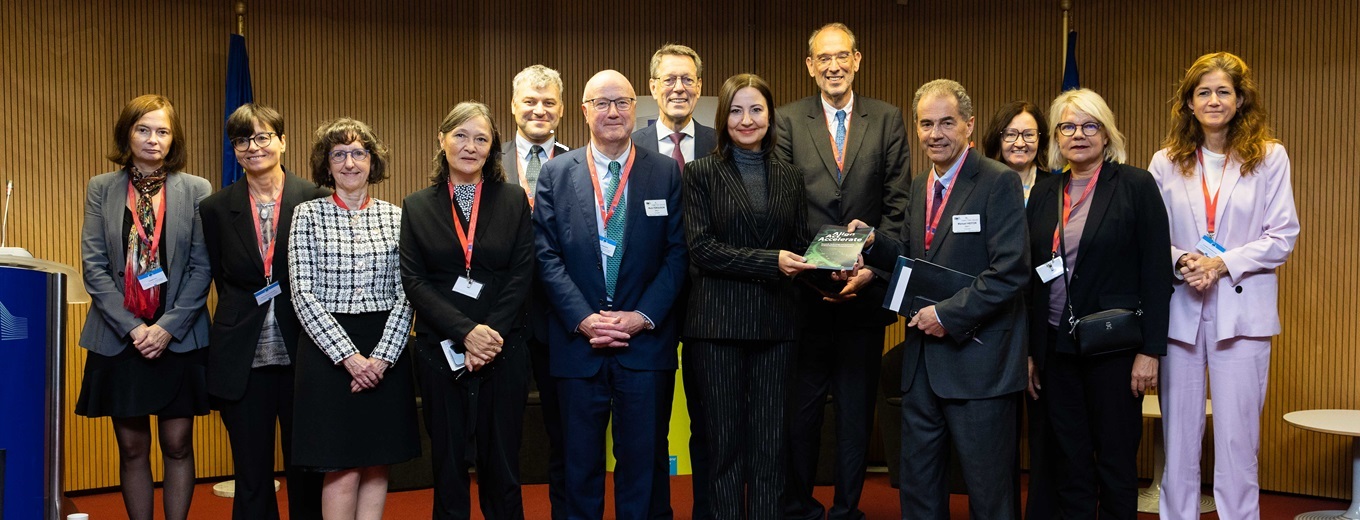Thought-provoking recommendations by Heitor’s high-level expert group on Horizon; and new Education Commissioner’s strong influence on the EU budget.
The publication of highly anticipated EU reports and documents relevant for research, innovation and education continued this month. On 16 October 2024, the high-level expert group on the interim evaluation of Horizon Europe published their final report (‘Heitor report’), entitled Align Act Accelerate. This report will be one of the key documents for the preparation of FP10. The report comes with twelve recommendations followed by background and evidence for each of them. The report fits in with the series of reports on the future of the EU and in particular of research, innovation and education. It shares the same analysis as the Draghi report (see SwissCore article) and President von der Leyen’s political guidelines (see SwissCore article): Increasing investment in R&I to boost competitiveness in the EU is the common key point.
The high-level expert group proposes a number of more or less radical changes for the future of the Framework Programme: the structure is supposed to be organised around four spheres of action with a ringfenced budget of €220 billion. The four spheres are i. competitive excellence, ii. industrial competitiveness, iii. societal challenges, and iv. strong research and innovation ecosystem. The expert group further wants to introduce new Councils, inspired by the ERC and the EIC, to guide these spheres. Concretely, an independent European Technology and Industrial Competitiveness Council (ETIC2) should bring together experts from public and private sectors to give direction for R&I policies and programmes. A new European Societal Challenges Council (ESC2) consisting of researchers from academia, charities and industry should in turn steer the Missions and Partnerships. Furthermore, the ERC, EIC and MSCA should be strengthened, and a new instrument for early-stage research careers should be introduced (called ‘Choose Europe’). However, in an effort of “radical simplification” the EIT and EIE should be cut, the widening instruments concentrated, and the Missions taken out of FP10. New instruments such as ARPA-style funding, and the use of AI tools and other new methods for identifying and reviewing proposals should be tested. Finally, the report suggests that the framework programme should embrace dual use research going forward. When it comes to international cooperation, the expert group underlines once more the mutual benefits of European collaborations with countries such as Switzerland.
The first reactions to the Heitor report were positive as it strengthens the narrative that research and innovation is essential to assure and boost European competitiveness. However, many commentators criticise that the expert group does not address the revolutionary idea from President von der Leyen to completely reorganise the EU funding programmes. A new European Competitiveness Fund should become the overarching umbrella for numerous Union programmes, including Erasmus and FP10. How this revolution of bundling all programmes together and increasing the political steer is compatible with the high-level expert groups suggestions is more than unclear.
Next week, from 4 to 12 November 2024, the Commissioners-designate will be entering their confirmation hearings in the European Parliament. As part of this process, they all submitted written answers to the Parliament committees. In their answers, several senior Commissioners-designate (Piotr Serafin for Budget, Stéphane Séjourné for Prosperity and Industrial Strategy, Teresa Ribera for Clean Just and Competitive Transition) confirm that the Commission will move towards a “policy-based budget” and indeed establish an “EU Competitiveness Fund, including research and innovation”. Specifically on research and innovation, Commissioner-designate Ekaterina Zaharieva confirms that her top priority is the development of FP10 with an expanded ERC and EIC. Furthermore, she announces that a European Research Area Act will be proposed “to foster the free movement of researchers”, which would be a major upgrade from the current European Research Area (ERA). It would be complemented by a European Innovation Act. Regarding education and skills, Executive Vice-President-designate Roxana Mînzatu is announcing the creation of a Union of Skills, as the overarching policy framework in EU education and training. This would include a new European School Alliance initiative to foster cooperation and mobility between schools. Ms Mînzatu also announced to move forward with the implementation of a European Degree and that the successful European University Initiative should be continued with more universities incentivised to join. Finally, based on her mission letter, it is particularly noteworthy that Ms Mînzatu will have an unprecedented role as Executive Vice-President in the preparation of the EU’s multiannual financial framework (MFF), working together with the Budget Commissioner “for a simpler, more focused and responsive long-term budget that reflects the European strategic priorities and our ambition to be an Investment Commission.”

